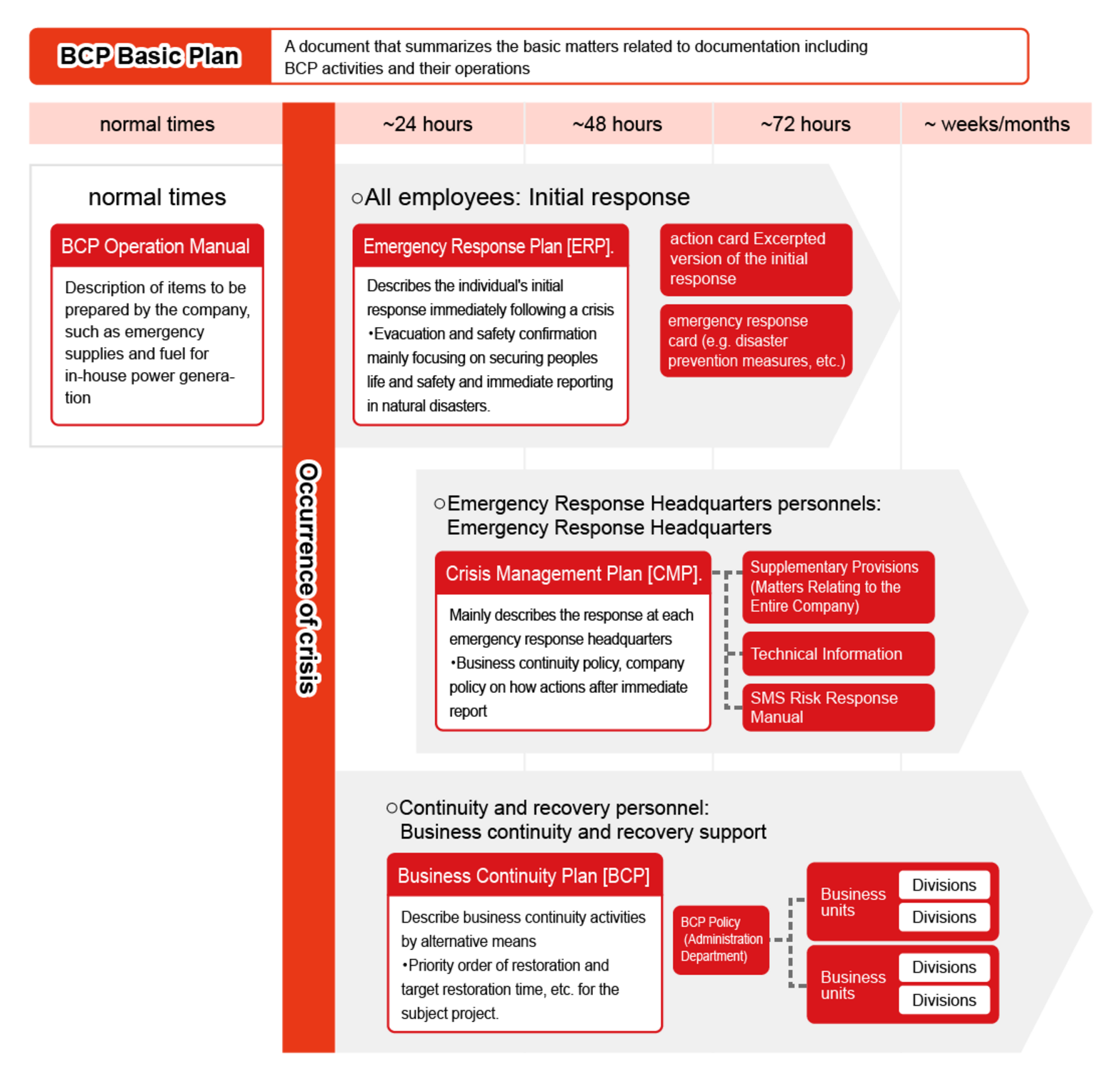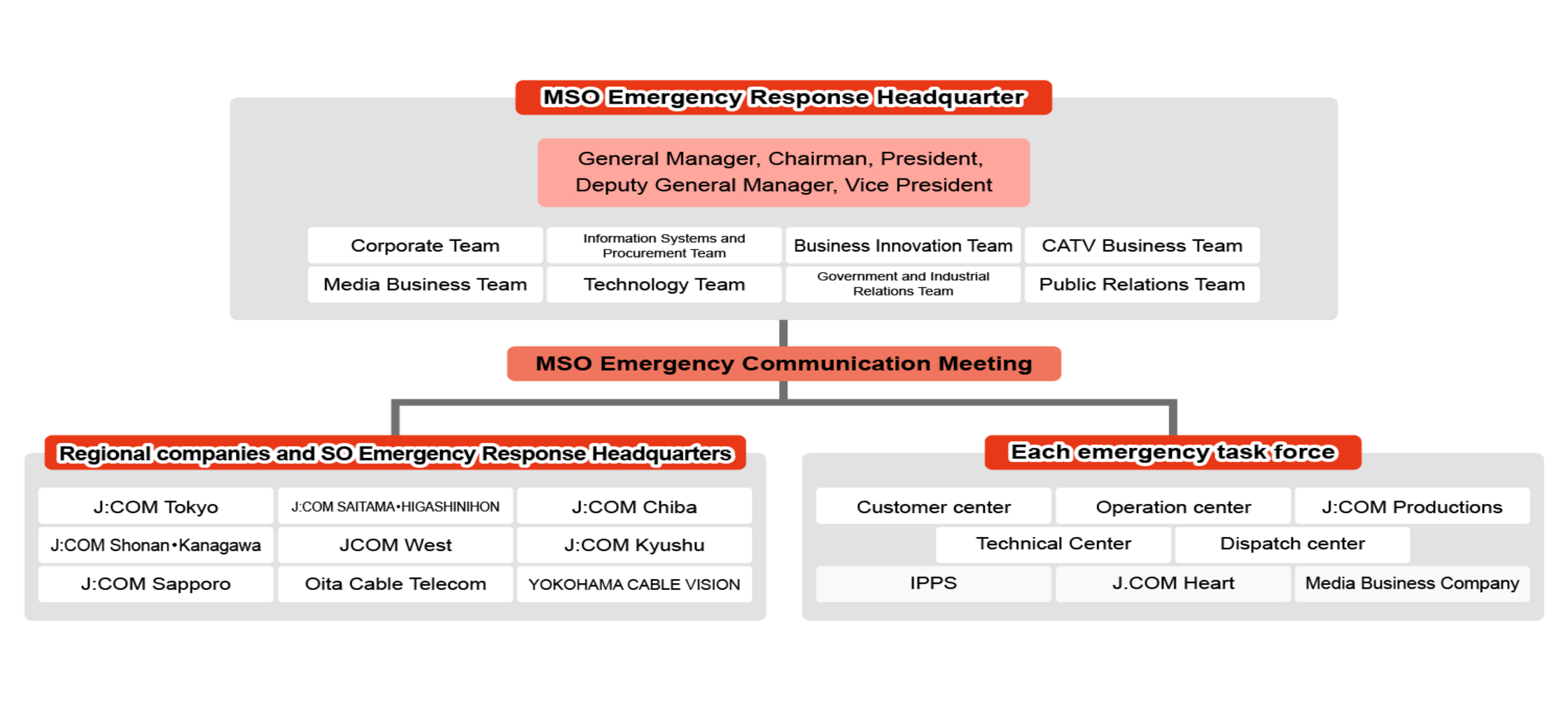Corporate governance
notice
Compliance
Based on the recognition that “compliance is essential for sound corporate business activities,” we have established a system to ensure thorough compliance with laws and social norms, etc. We are striving to improve compliance awareness among employees.
Compliance system
In order to strengthen and promote the company-wide compliance system, we have established the Compliance Committee, which is chaired by the head of the corporate department and reports directly to the president.
We create and revise the "Compliance Manual" and distribute it to full-time employees and contract employees of our company and consolidated subsidiaries to foster understanding and awareness of compliance-related issues.
In addition, we formulate a "compliance plan" and promote awareness and education about compliance and various compliance measures in a multi-layered manner under the basic policy that we set according to the social situation and the times.
Speak up system

At our company, when a problem arises from the viewpoint of compliance, if it is difficult to report it through the normal organizational line, the person who noticed the problem can contact the Compliance Committee directly or through an external lawyer or our full-time corporate Audit & Supervisory Board Member We have introduced the “Speak Up System” in our group.
Under this system, information communication can be conducted regardless of whether the person is named or anonymous, and the confidentiality of the information contact person and the content of communication is strictly protected, and it is guaranteed that the contact person will not be treated disadvantageously due to information communication. I'm here.
Compliance efforts
At our company, we take up compliance as the theme in various trainings, such as training for managers and training for new hires, in order to familiarize and unify awareness of compliance.
As a main initiative, the president sent out a compliance message to share values and raise awareness of compliance. I picked it up. In addition, in order to prevent the occurrence of the Group's legal and social responsibilities, we hold weekly general meetings for the sales staff of each cable television station to discuss potential issues that may arise in the field of sales. By sharing specific examples of violations, we are working to strengthen compliance awareness.
Furthermore, for the first time, we implemented compliance learning through e-learning for all employees. This is done by conducting orientations on laws and regulations related to the Group's business, fair trade and the handling of personal information, etc., using the "Compliance Manual" on the web, and by conducting confirmation tests, thereby increasing knowledge and understanding of compliance. It promotes awareness.
Through the wide variety of initiatives described above, the Company strives to raise awareness of compliance among officers and employees.
Dealing with anti-social forces
For the development of the local community and society, we will thoroughly cut off all relationships with anti-social forces, and if there is a demand for the provision of unfair benefits, we will take a resolute attitude and not respond to the other party's demand.
Risk management
Approach to risk management
In the event of a disaster, J J:COM will make every effort to ensure the safety of all J:COM and group company employees and their families, and in view of the public nature of our business, we will continue or restore service to the extent possible. We have put in place a system to achieve this goal. In addition, we recognize in advance any crisis that could potentially result in significant losses to corporate management and business activities, and take steps to prevent such situations from occurring. In the unlikely event that a crisis occurs, we have established a crisis operation policy to minimize losses.
Risk management system
J:COM At J:COM, the representative Director and other Director in charge of business execution are responsible for developing a comprehensive risk management system for the Group with regard to all risks associated with corporate activities, and promoting risk management in each department in charge. Specifically, the Head Office Administration Department oversees company-wide risk management activities, analyzes and mitigates risks during normal times, and establishes emergency response and reporting systems in accordance with the BCP manual. Each department strives to improve the level of risk management through the establishment of regulations pertaining to the operations under their respective jurisdiction and the formulation of risk management policies and manuals. In addition, when each department discovers a risk of loss, it is required to immediately report it to the Director and Audit & Supervisory Board Member in charge. In addition, the Internal Audit Department and the Internal Control Promotion Department conduct internal audits in accordance with the Internal Audit Regulations to evaluate the status of internal control of the management organization and compliance with laws and regulations pertaining to business operations, and to monitor the risk situation across the J:COM Group.
BCM (Business Continuity Management)
J:COM has prepared the following BCP manual in order to promptly and accurately respond in the event of an emergency. Specifically, we have developed a "BCP Basic Plan" as the basis, a "BCP Operation Manual" for preparations during normal times, an "Emergency Response Plan (ERP)" and "Crisis Management Plan (CMP)" for responding to crises. In addition to formulating a "Business Continuity Plan (BCP)," we have determined the target audience and timing of each document's use.
In the event of an emergency, emergency response headquarters will be set up at the head office and local bases to respond. Since the Great East Japan Earthquake, based on the lessons learned from major disasters in recent years, we have conducted disaster drills assuming large-scale disasters at least once a year.

About J:COM 's business continuity management (BCM)
At J:COM, we have established a Business Continuity Management (BCM) in order to provide stable services to our customers even in the event of an emergency.
1. Group-wide efforts
In the event of an emergency, the J:COM Group will work together as a group to restore and continue services.
2. Assumed crisis event
J:COM has established initial response procedures in the event that any crisis event occurs or is likely to occur, and takes appropriate crisis responses to minimize losses in the event a crisis event occurs. We are proceeding with countermeasures.
Major crisis events
- Infrastructure service failure
- broadcast failure
- In-house system failure
- Product accident
- earthquake
- fire
- Typhoon, torrential rain
- H1N1 influenza
3. Disaster-resistant networks and facilities
At J:COM, we believe it is our responsibility to strive to improve the stability and reliability of our network so that our customers can comfortably use our diverse services and continue to serve as a public vessel that supports our customers' lives. I am.
J:COM cable network
The cable network installed by J:COM is designed and constructed with multiple routes (redundancy) in mind, and even in the event of a cable break, it has become a disaster-resistant system that automatically detects an alternate route. I am.

J:COM important facilities
The master headend and program transmission equipment buildings, which are important bases for J:COM, are designed to withstand large-scale disasters such as an earthquake directly hitting the Tokyo metropolitan area, and even in the event of an emergency, we can continue to provide services while ensuring safety. is possible.

4. Provision of disaster prevention and disaster information
At J:COM, we are in the process of concluding disaster prevention agreements with local governments in our service areas, and we are delivering information to protect local safety and security through various means through J:COM 's community channels.
5. Business Continuity Basic Policy
As Japan's largest cable television company, a media company leading the multi-channel market, and a service provider with deep roots in the community, J:COM is strongly aware of its social responsibility in the event of an emergency. At J:COM, in the event of an emergency, we will respond based on the following basic policy.
- As a company responsible for social infrastructure, our basic policy is to ensure both the safety of all employees and their families and the restoration and continuation of services.
- In the cable TV business (cable TV, internet connection, Landline, mobile, electric power), we are responsible as a company that provides lifelines, and as a company that operates media (community channels) that can disseminate disaster information on a municipal basis. We take responsibility and act accordingly.
- In the program supply business, we are aware of our responsibility to distribute programs throughout Japan, and strive to ensure that the provision of services to customers will not be significantly restricted even in the event of an emergency in the Tokyo area where our head office is located. increase.
- In the event of a wide-area disaster, support will be provided from bases and group companies in areas other than the affected area, and all J:COM will provide support to the affected area.
6. Emergency response system
At J:COM, in the event of an emergency, an emergency response headquarters will be established at J:COM headquarters and each base, and the response headquarters across the country will work together to respond in accordance with the following response principles.
Basic principles for J:COM disaster response
-
Principle 1
have one chain of command
-
Principle 2
aggregate information
-
Principle 3
Emphasis on on-site judgment
J:COM emergency response headquarters

Information security
As a company that provides broadcasting and communication services, J:COM is responsible for strictly managing customers' personal information and our company's confidential information.
Information management system
In addition to enacting "Basic Regulations for Information Security Management," we have established an Information Security Committee that reports directly to the president to promote measures to strengthen information security.
Efforts to protect personal information
Regarding the protection of personal information, almost all Group companies have acquired the Privacy Mark (P Mark) issued by the Japan Information Processing Development Corporation (JIPDEC), and have built an internal management system that can handle personal information appropriately. I'm here. Once a year, we conduct an educational test for all employees to raise internal awareness of the importance of protecting personal information. For details, please check the "Privacy Policy" on our website (www.jcom.co.jp).
Information Security Initiatives
Regarding information security, we are working on information security under the "Information Security Basic Policy". We are taking measures against security holes* for all our internal systems. Regarding personal computers of employees, the use of USB media is restricted, and prior application to the information management manager is obligatory when taking them out of the company. In addition to orientation training for mid-career hires, we are also working to strengthen information security education for employees, such as conducting e-learning.
- *Security holes: Problems and vulnerabilities in software and network design. If security holes are left unattended, there is a risk that malicious users may operate computers illegally and threaten our information assets, so regular checking and repair work is required.
invoice system
The invoice system, also known as the ``qualified invoice storage system,'' is a method of input tax credit for consumption tax, and will start from October 1, 2023.
An invoice is called a "qualified invoice" and is used by the seller (JCOM) to inform the buyer (customer) of the exact applicable tax rate, consumption tax amount, etc.
In addition, a qualified invoice is a document or data that includes the "name and registration number of a qualified invoice issuing business," "applicable tax rate," and "consumption tax amount, etc."
Qualified invoices can only be issued by qualified invoice issuing businesses that have been registered with the Director of the Tax Office.
Partnership building declaration
J:COM has formulated a "Partnership Building Declaration" in order to build new partnerships by promoting cooperation and coexistence and co-prosperity with our supply chain business partners and businesses that aim to create value. It has been announced.
J:COMグループ持続可能な責任ある調達方針
As a business operator that plays a role in the broadcasting and telecommunications industry, J:COM Group always maintains high ethical standards and social decency and takes the initiative in fulfilling its responsibility to realize a sustainable society. In order to avoid risks as much as possible, we have established a "Sustainable and Responsible Procurement Policy" and ask all business partners to understand risks and strengthen and promote risk management.
- Corporate information top
- About J:COM
- Company Profile
- Announcement of financial results
- Corporate governance








